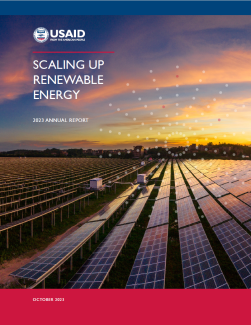Scaling Up Renewable Energy 2023 Annual Report
In 2023, SURE worked across the globe, advising governments, utilities, private developers, banks, and others on actions to increase renewable energy deployment and integration, improve electricity access, and power brighter futures for all.
USAID’s Scaling Up Renewable Energy (SURE) program helps partner countries meet the increasing energy demand necessary for economic growth by accelerating the adoption of widely accessible, affordable, reliable, and sustainable energy sources. As technological advancements continue to drive down renewable energy prices, electricity generated via solar and wind becomes more cost-effective than electricity generated from fossil fuels.
With the right combination of technical, policy, and social benefit planning, renewables can power economies while opening markets to private investment, combating the climate crisis, and creating local jobs for communities where industry and employment may be limited.
2023 Highlights
Through SURE, USAID helped partner countries accelerate their own transitions to clean energy and move closer to achieving net-zero global carbon dioxide emissions by 2050. Following are highlights from the past year.
- Increasing Energy Resilience. In Colombia, SURE provided technical support to help reconstruct and strengthen the resilience of Providencia Island’s power grid after a devastating hurricane. SURE worked with the Ministry of Mines and Energy (MME) to procure a 2.5 megawatt (MW) battery energy storage system to complement a planned 1.8 MW solar farm, and to identify strategies and actions to advance electric mobility (e-mobility) and create the first completely electric transportation system in the country. Providencia’s shift toward renewable energy and storage is estimated to reduce diesel fuel consumption by 30 percent and imported fuel costs by over $450,000 per year. SURE also supported the Fund for Non-Conventional Energy and Energy Efficiency (FENOGE), a key player in financing Colombia’s just energy transition, to implement its first gender and diversity policy and action plan, which will create systemic change to promote gender equality and economic opportunity in the energy sector. The Climate Change Business Journal recognized SURE’s work in Colombia as “a model that other nations with low-carbon ambitions can replicate.”
- Evidence-Based Decision Making. In Egypt and Guatemala, SURE assessed the power sectors to provide insights that can be used to design new development projects. SURE also assessed the draft auction design in Jamaica, where experts identified barriers to investment and recommended improvements based on international best practices. In Ecuador, SURE experts interviewed private companies and government officials to obtain lessons learned from the last energy procurement and identify improvements for the new procurement process. These thoughtful and thorough assessments are helping governments achieve their goals related to energy, decarbonization, and inclusive economic growth.
- Equity and Inclusion. SURE provided technical assistance to financial institutions and power utilities to identify, understand, and address gender-based differences in services. In Africa, SURE is helping Acre Impact Capital build gender-sensitive approaches into its energy project financing models. Acre plans to allocate over $300 million to countries across Africa by 2028, including financing to women and gender-sensitive energy projects. SURE helped Distribuidora de Electricidad del Sur (DELSUR) in El Salvador to identify clean energy and energy-efficient appliances that can help women increase productivity, and is supporting the design of a financing program that will enable unbanked women to pay for the appliances over time through their electricity bill.
- Supporting Indigenous Populations. SURE worked with the Colombian vocational training agency Servicio Nacional de Aprendizaje (SENA) to develop a workforce development program in La Guajira, Colombia, that trained 37 young adults, 21 of whom are women, from the Indigenous Wayuu community to enter the local clean energy job market. The trainees completed a nine-month academic course and started internships at a solar systems installation company, where they are acquiring hands-on skills and knowledge on solar photovoltaic (PV) projects. Following a six-month internship, trainees start permanent positions in the company.

